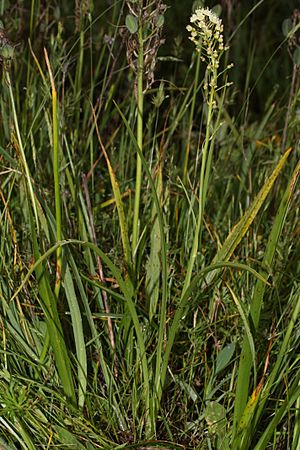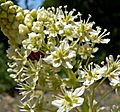Toxicoscordion venenosum facts for kids
Toxicoscordion venenosum, often called death camas or meadow death camas, is a type of flowering plant. It belongs to the Toxicoscordion genus and the Melanthiaceae family. This plant grows naturally in western North America.
Quick facts for kids Toxicoscordion venenosum |
|
|---|---|
 |
|
| In Kingston Prairie Preserve, near Stayton, Oregon | |
| Scientific classification |
|
| Kingdom: | Plantae |
| Clade: | Tracheophytes |
| Clade: | Angiosperms |
| Clade: | Monocots |
| Order: | Liliales |
| Family: | Melanthiaceae |
| Genus: | Toxicoscordion |
| Species: |
T. venenosum
|
| Binomial name | |
| Toxicoscordion venenosum (S.Watson) Rydb.
|
|
| Script error: The function "autoWithCaption" does not exist. | |
| Synonyms | |
|
|
Script error: No such module "Check for conflicting parameters".
People who speak Sahaptin call this plant alapíšaš. In the Ktunaxa language, it is known as nupqasaquⱡ (pronounced "nup-ka-sa-qush").
Contents
What Does Death Camas Look Like?
Toxicoscordion venenosum can grow quite tall, up to 70 centimeters (about 27 inches). It has long, grass-like leaves that grow from its base.
Bulbs and Flowers
The plant has oval-shaped bulbs underground. These bulbs look a lot like onions. However, they do not smell like the edible onions we use for cooking. This is a very important difference to remember!
The flowers of the death camas are usually cream-colored or white. They grow in tall, pointed clusters. You can see these flowers blooming between April and July.
Where Does Death Camas Grow?
This plant is found in many places across Western Canada, the Western United States, and northern Baja California in Mexico.
It likes to grow in dry areas. You can often find it in dry meadows and on dry hillsides. It also grows on slopes with sagebrush and in mountain forests.
Why is Death Camas Dangerous?
All parts of the death camas plant are poisonous. This means it is very dangerous for both humans and animals, especially livestock like cows or sheep.
Plant Toxins
The plant contains special chemicals called alkaloids. These alkaloids, like zygacine, are very harmful. They can affect the nervous system, which is why they are called neurotoxic alkaloids. Eating even a small amount can be very dangerous.
Who Can Tolerate the Toxins?
Interestingly, there is a special type of bee called Andrena astragali that visits this plant. This mining bee might be the only bee that can handle the plant's toxins.
See also
 In Spanish: Toxicoscordion venenosum para niños
In Spanish: Toxicoscordion venenosum para niños
 | Percy Lavon Julian |
 | Katherine Johnson |
 | George Washington Carver |
 | Annie Easley |





